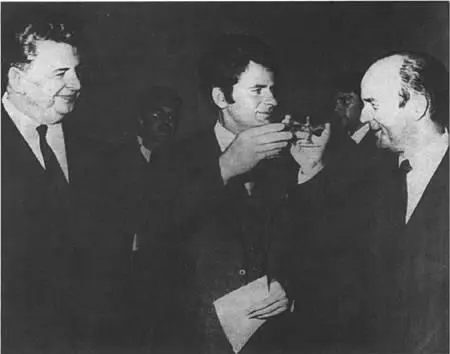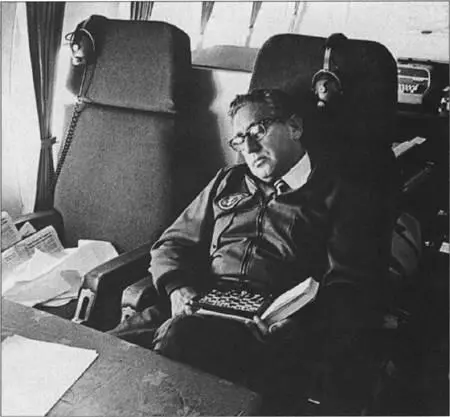
Left to right: Soviet ambassador Sergei Astavin, Boris Spassky, U.S. chargé d’affaires Theodore Tremblay. A vin d’honneur for being there. ASSOCIATED PRESS
Fischer’s aide Fred Cramer dismisses Fischer’s absence from the ceremony, describing it as “a musical concert with speeches in Icelandic which he wouldn’t have understood.” Meanwhile, one man seems to have guessed what is going on. Spassky chats amicably with Yugoslav grandmaster Svetozar Gligoric, telling him that he is looking forward to a two-month vacation, and then will return to Moscow to play Petrosian.
As Thorarinsson pondered his next move, Fischer was still in Douglaston, immured in Sabbath observance. His demands were still on the table, and there seemed no question of his boarding a plane. Out of sight of the world’s press, he was refusing to respond to letters, take calls, or answer the door.
With the match in a quagmire, there now came two attempts at its rescue: the first from the heart of Nixon’s White House, the other a true deus ex machina from one of the richest men in Britain, whose decision to intervene came as he was in a car driving through London.
The Icelandic government might have played a part in securing the first intervention. Although it had no direct role in the match, national prestige was at stake, and the prime minister, Olafur Johannesson, was deeply concerned at the possibility of failure. He and Thorarinsson were in the same political party, the Progressive Party, a center-left farmers movement. And Gudmundur Thorarinsson decided he had to ask him for assistance.
He, Thorarinsson, had been searching nonstop for a way ahead. Could he persuade Spassky and Fischer to talk to each other directly? The champion was refusing to call his challenger but readily agreed to take Fischer’s call if the American rang. Fischer, however, seemed unlikely to respond to a request to phone Spassky. Spassky then summoned the Icelander to a meeting at his hotel.
He said, “Gudmundur, this is a very serious situation. This can only be solved at a higher level.”
I looked at him and said, “Well, yes, maybe that is the way. We’ll solve it at a higher level.” And after we shook hands I went to see the prime minister. I said, “We’re in serious trouble, and I think you should come into the picture. You have to phone the White House and ask them to use their influence on Fischer.”
“Oh, no, no, no, no,” he said. “You’re a young man, and things don’t happen that way.” Then he thought about it and said, “If you’re quite determined, I’ll do what I can.” And he phoned the American embassy.
But the Russian and the Icelander were at cross-purposes. Thorarinsson was so focused on bringing the American to the match, it did not enter his mind that Spassky might need help himself. The prime minister then called in the U.S. chargé d’affaires Theodore Tremblay. Would the American government lend a hand?
Tremblay was intensely irritated with Fischer. At the opening ceremony, his wife had been sitting next to the empty chair, on the other side of which sat Spassky. But he was inclined to help. Uppermost in his mind, in a fragile phase in U.S.-Icelandic relations, was the U.S. base at Keflavik. The Icelandic coalition government—the only NATO country with communist ministers—was considering its future. Closure could have strategic consequences for the Western alliance. Iceland’s geographic position, midway between the United States and the Soviet Union, made this desolate island an invaluable ally. The Soviets were pressing on with a new blue water naval strategy, and Iceland served as a critical forward observation post, monitoring Soviet ship and submarine movements.
As well as protection, Keflavik had brought employment and wealth. Yet many Icelanders felt resentment rather than gratitude: the base led to anxiety that Icelandic culture was threatened by the alien presence of so many foreigners. The ambiguity toward America was nothing new. At the end of the nineteenth century, a visitor depicted the American whaler “dashing ashore in his civilian dress, and flinging his dollars everywhere, drinking, roistering, catching the ponies, and scampering off, frightening the Icelander out of his wits.” And in his 1948 novel, The Atom Station, the Nobel Prize-winning Icelandic author Halldor Laxness catches this dissonance in the image of two small boys playing chess while the radio blares out American music. The heroine reflects: “I contemplated once more the civilized peace of the chess game amongst the din from the American radio station.”
Over and above the geopolitical considerations, Tremblay was also fond of the Icelandic people. “I hated to see this thing blow up in their face because of Fischer’s ignorant attitude.” He recalls the prime minister telling him how much Iceland had laid out for the match and asking, “Is there any way we can get him here?”
Back at the U.S. embassy, Tremblay sent a telegram addressed to the secretary of state, William Rogers, and copied to the National Security Council and the CIA. It recited that the chargé had been summoned by Olafur Johannesson to express concern at Fischer’s nonappearance: the United States government was not accountable for the imbroglio, but Fischer’s actions, he said, were an insult to Iceland, and cancellation would cost seven million kronur. “Everyone knows that Fischer erratic [sic] and not susceptible to control by USG but actions were bound to hurt US image.” The prime minister had asked Tremblay to relay this concern to the White House. “While he realizes it might not do any good, he would appreciate an immediate attempt to persuade Fischer to live up to his agreement.”
Given that these events unfolded over a weekend, it remains unclear whether Tremblay’s telegram produced any result. We can simply observe a chain of events: Johannesson’s request preceded Tremblay’s action, which was followed by a call to Douglaston made by the national security adviser, Dr. Henry Kissinger.
In an interview with the authors, Dr. Kissinger rejected any idea that this call was made in an official capacity. “It was not a big political thing. I did not have a big staff paper to say you’ve got to do this. It somehow came to my attention.” Kissinger makes no claims for his own chess expertise. “I am a rank amateur.” He refused to play the Soviet ambassador Anatoli Dobrynin, a keen player, in case it gave his adversary an insight into the way his mind worked. The opening words of Kissinger’s conversation with Fischer have entered chess lore: “This is the worst player in the world calling the best player in the world.” He recalls, “There was a difficulty in the operation, an upset. I just wanted Fischer to know that his government wished him well. I wished him well.”
Thorarinsson learned from the “American attorneys” about Fischer’s reaction.
They were in the room with Fischer when Kissinger phoned. Kissinger had said to Fischer, “America wants you to go over there and beat the Russians.” And Fischer changed, becoming like a young soldier going to war. When they asked him later, why did you change your mind, he said something like “I have decided that the interests of my nation are greater than my own.”
No doubt the attorneys felt suitably humbled at so selfless a display of patriotism by their client—and puzzled by his continued failure to leave his Douglaston foxhole for the battlefront.

After his call, next move Fischer. THE WHITE HOUSE
Meanwhile, in Reykjavik, the American team was pushing Thorarinsson for financial concessions in ways he had never experienced and thought utterly unreasonable. He felt that if he yielded to one of their demands, he would simply open the door to many more. “So we very stubbornly said, ‘This is our offer. We will live up to it, but this is all we can do and we’re not changing it.’” Almost admiringly, he recollects their tactics. “They would always say, ‘This is nonsense. We’re against it. We are telling you this as a friend: To save the match, you have to do this and this. Otherwise there will be no match.’ There was no hostility. They were just giving me advice! They came with papers and they said, ‘There’s no problem, you just sign here.’” The Icelander was in culture shock:
Читать дальше














